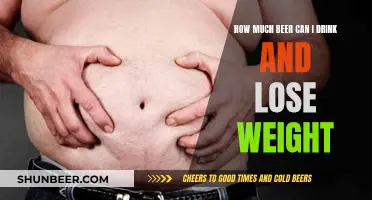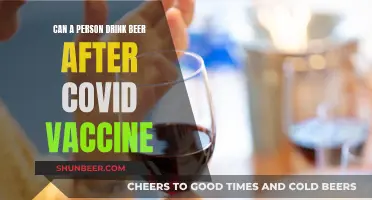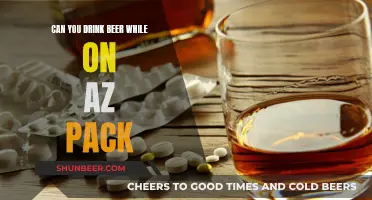
Beer is a carbonated beverage, and the tiny bubbles inside are small pockets of carbon dioxide infused during the brewing process. When you drink beer, the carbon dioxide collects in your stomach and enters your digestive system, which can cause discomfort. This is why people, especially those with sensitive stomachs, are advised not to chug beers or drink them too quickly. In addition to carbonation, drinking beer quickly can also increase the amount of air you swallow, leading to even more discomfort and pressure in your chest or abdomen. To avoid this, it is recommended to drink beer slowly and avoid using a straw, as it can worsen your burping.
| Characteristics | Values |
|---|---|
| Why does beer make you burp? | Beer is carbonated during the brewing process, which produces tiny bubbles of carbon dioxide gas. This gas builds up in the stomach and is released as a burp. |
| How to reduce burping when drinking beer | Drink beer slowly, avoid chewing gum or smoking, and ensure that dentures fit well |
| Health conditions related to burping | Excessive burping can be a symptom of gastroesophageal reflux disease (GERD), irritable bowel syndrome (IBS), or other gastrointestinal issues. |
What You'll Learn

Beer's carbonation leads to burping
Beers Carbonation Leads to Burping
Beer is a carbonated beverage, and like all fizzy drinks, it contains an excess of gas, specifically carbon dioxide. This gas is infused during the brewing process, creating the tiny bubbles that give beer its sharp, fizzy taste. When you drink beer, the carbon dioxide bubbles collect in your stomach and enter your digestive system, which can become uncomfortable, leading to a burp.
The burping reflex is triggered by the accumulation of gas in the stomach, which causes the stomach to expand. This sets off a chain reaction, starting with the relaxation of the lower esophageal sphincter (LES), allowing the gas to travel up the esophagus. As the gas reaches the top of the esophagus, it stretches, triggering a second reflex that relaxes the upper esophageal sphincter (UES). The gas is then released through the mouth, along with a distinctive, croaky sound – a burp, or gastric belch.
The amount of burping can be intensified by the speed at which you drink. Chugging or drinking beer too quickly can result in swallowing a lot of air, which then escapes back up the esophagus as a burp. Additionally, drinking a large quantity of beer can fill your stomach to the point where it needs to make room for digestion, leading to burping.
To reduce burping while drinking beer, it is recommended to slow down your consumption and avoid chugging. Other activities that can contribute to swallowing extra air, such as chewing gum or smoking, should also be avoided. While it may be challenging to completely stop burping, making these small changes can help minimize its occurrence and intensity.
So, the next time you're enjoying a beer, remember that the carbonation is a key factor in those post-drink burps!
Beer and Fentanyl: A Risky Mix?
You may want to see also

Drinking beer quickly increases air swallowed
Drinking beer, especially when done quickly, increases the amount of air swallowed. This is due to the carbonation in beer, which results in an excess of carbon dioxide gas. These gas bubbles collect in the stomach, causing a buildup that can be uncomfortable. As a result, the body's natural response is to burp and release the gas.
The act of drinking quickly can further exacerbate this issue, as it increases the amount of air swallowed along with the beer. This leads to discomfort in the esophagus and a build-up of pressure in the chest or abdomen. The lower esophageal sphincter (LES) relaxes, allowing the gas to travel up the esophagus and exit through the mouth as a burp.
To reduce burping while drinking beer, it is recommended to slow down the drinking pace and avoid chugging. Additionally, avoiding the use of a straw, reducing talking while drinking, and refraining from chewing gum or eating hard candy can also help minimise air intake.
Excessive burping can sometimes be a symptom of gastroesophageal reflux disease (GERD) or other underlying conditions. If burping interferes with daily life, it may be advisable to consult a doctor.
Drinking Beer and Driving: Is It Safe?
You may want to see also

Drinking too much beer leads to burping
Drinking beer, especially in large quantities, often leads to burping. Beer is a carbonated beverage, and the excess gas it contains can cause burping. The carbonation process involves infusing beer with carbon dioxide gas, which creates the sharp, fizzy sensation we associate with beer. This gas accumulates in the stomach and eventually leads to a burp.
The act of swallowing beer, particularly when done quickly or in large amounts, can also contribute to burping. When we eat or drink, we also swallow air, which can cause the stomach to expand and result in discomfort. The body's natural response to this is to get rid of the excess air through burping.
Additionally, drinking beer can trigger gastroesophageal reflux disease (GERD) in some individuals. GERD occurs when stomach contents are pushed upwards into the oesophagus, and burping is a common symptom of this condition. Other symptoms of GERD may include heartburn and difficulty swallowing.
To minimise burping after drinking beer, it is recommended to drink slowly and avoid chugging or drinking too quickly. Using a straw should also be avoided, as it can worsen belching. Talking excessively while drinking and chewing gum can also lead to increased air swallowing and subsequent burping.
Excessive burping can sometimes be a sign of underlying conditions, such as GERD, aerophagia, or supragastric belching. If burping becomes bothersome or affects your quality of life, it is advisable to consult a doctor to identify and address any potential underlying causes.
Beer Fest: How Much Beer Should You Drink?
You may want to see also

Ways to reduce burping when drinking beer
Beer is a carbonated beverage, and the excess of gas in it is what leads to burping. While burping is a natural bodily function, it can be unpleasant and embarrassing. Here are some ways to reduce burping when drinking beer:
Drink Slowly
Avoid chugging or drinking beer too quickly. Drinking slowly reduces the amount of air swallowed and can help prevent burping.
Avoid Straws
Using a straw while drinking beer can worsen belching as the narrow tool vacuums up air.
Avoid Talking While Drinking
Talking while drinking or chewing can lead to swallowing more air, which can contribute to burping.
Choose a Different Brand
Different beer manufacturers infuse varying volumes of carbon dioxide, resulting in different levels of froth and fizz. Opting for a brand with less carbonation may help reduce burping.
Avoid Chewing Gum and Hard Candies
Chewing gum and sucking on hard candies can make you swallow more, leading to increased burping.
Avoid Carbonated Drinks
Carbonated drinks, including beer, contain carbon dioxide gas, which can cause bloating and burping. If you find that beer particularly triggers burping, you may want to consider reducing your consumption or choosing a different beverage.
Lifestyle Changes
Making some lifestyle changes can also help reduce burping. These include stopping smoking, ensuring well-fitting dentures, managing stress, and treating nasal congestion.
Pregnancy and Non-Alcoholic Beer: What's the Verdict?
You may want to see also

Why burping is worse when drinking beer than other drinks
Drinking beer can lead to more frequent and intense burping compared to consuming other drinks, and there are several reasons for this.
Firstly, beer is a carbonated beverage, containing an excess of gas, specifically carbon dioxide, which is infused during the brewing process. This carbonation results in the sharp, fizzy sensation we associate with beer. When consumed, the carbon dioxide gas accumulates in the stomach, eventually leading to a burp. The burping can be exacerbated if the beer is consumed quickly or chugged, as this introduces additional air into the stomach, increasing the likelihood of a burp.
Additionally, the act of drinking beer can involve behaviours that further contribute to burping. For example, drinking from a straw, talking while drinking, or chewing gum can all lead to the swallowing of more air, which can then escape back up the oesophagus as a burp.
Furthermore, for some individuals, drinking beer may trigger gastroesophageal reflux disease (GRED). GRED occurs when stomach contents are pushed upwards into the oesophagus, and burping is a common symptom of this condition. While burping may be the only symptom, it can also be accompanied by heartburn and difficulty swallowing.
While burping is a natural bodily function, excessive burping can be embarrassing and socially inconvenient. To mitigate this, it is recommended to drink beer slowly, avoid using straws, and refrain from talking or chewing gum while drinking. Additionally, different beer brands may have varying levels of carbonation, so changing the brand of beer may also help reduce burping.
Drinking Beer While on Celexa: What You Need to Know
You may want to see also
Frequently asked questions
Beer is carbonated, which means it contains carbon dioxide. This gas accumulates in your stomach and eventually leads to a burp.
Yes, if you drink beer quickly, you're more likely to swallow air, which can lead to burping. Additionally, drinking too much beer can fill your stomach, causing you to burp to release the excess gas.
Yes, drinking your beer slowly can help reduce burping. You should also avoid other activities that involve swallowing extra air, such as chewing gum or smoking.
Burping is generally a natural and harmless occurrence. However, excessive burping could be a symptom of gastroesophageal reflux disease (GERD) or other underlying conditions. If you experience frequent or uncontrollable burping, it's a good idea to consult a doctor.
While burping may be considered impolite in some social situations, it is a natural and common occurrence when drinking beer. It's generally accepted that burping may happen when drinking with friends, and it's usually met with understanding rather than embarrassment.







